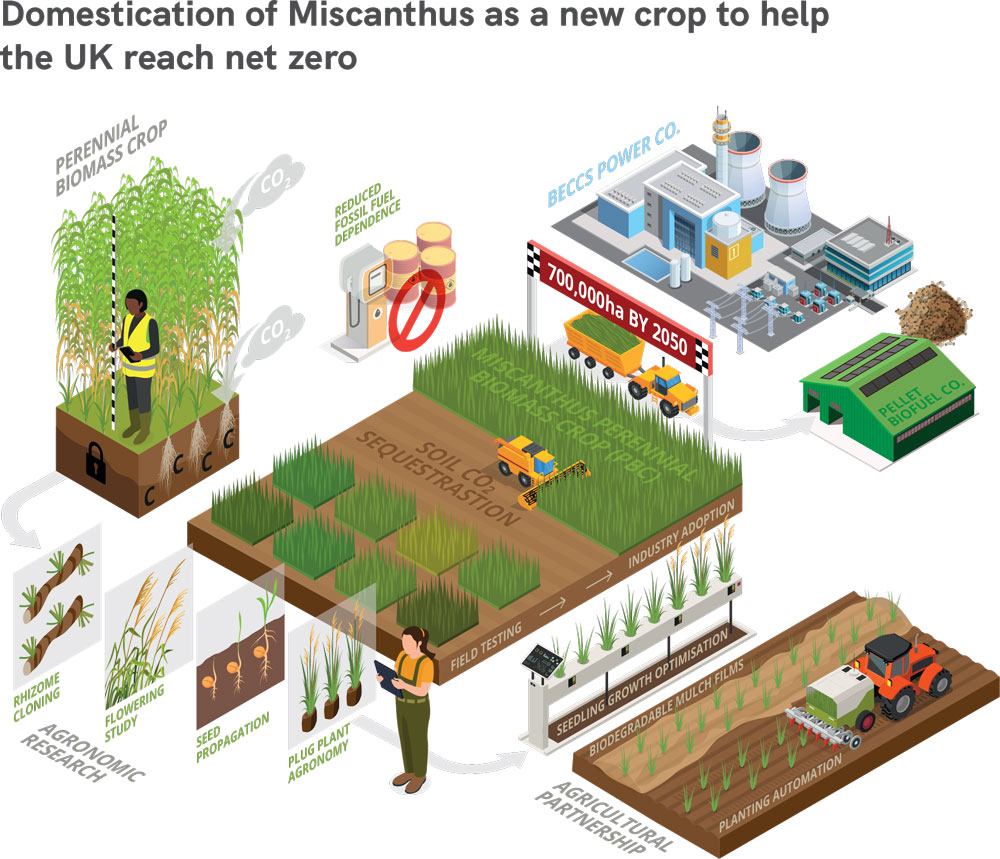Scalable Miscanthus Biomass Impact Case Story
Scalable Miscanthus Biomass

Meeting the Challenge of Net Zero
The transition to a bioeconomy requires sustainable sources of plant biomass for green manufacturing (e.g. chemicals, construction materials, and steel production) and alternative transport fuels (for road, shipping, and aviation).
Plant biomass from perennial crops such as Miscanthus is critical for facilities that combine bioenergy with carbon capture and storage (BECCS)—a key pathway for the UK to achieve net zero by 2050. Current evidence suggests BECCS is the most effective route to remove carbon dioxide from the atmosphere, as it can deliver reductions more quickly than planting new forests.
Why Miscanthus?
Although classed as a tropical grass, Miscanthus is an ideal biomass feedstock for the UK because of its:
- High productivity even on marginal land.
- Perenniality, meaning no need for annual ploughing and planting.
- C4 photosynthesis, which is highly water- and nutrient-efficient and typically only found in tropical grasses that can’t thrive under temperate conditions.
- Adaptability to challenging conditions such as low temperatures, drought, and flooding.
This combination makes Miscanthus unique among biomass crops, offering both resilience and sustainability.
Scientific Innovation at IBERS
IBERS scientists have:
- Collected Miscanthus germplasm from diverse environments worldwide
- Combined trait biology with crossbreeding to produce new varieties suited to the UK climate and beyond
- Sequenced the complex Miscanthus genome to underpin future research
- Advanced agronomy for large-scale Miscanthus production
Key breakthroughs include the development of:
- Genomic selection to speed up breeding progress
- Speed breeding techniques to shorten crop cycles
- Seed-based propagation, allowing more rapid and scalable production
Where crops like wheat and maize were domesticated over thousands of years, Miscanthus has been developed into a commercial crop in just 20 years—in line with the UN’s Nagoya Protocol on biodiversity.
From Research to Commercialisation
The IBERS Miscanthus improvement programme has resulted in the registration of the world’s first Miscanthus varieties (seven in total) for biomass use. These are licensed exclusively to our industrial partner Terravesta, supporting the scale-up of Miscanthus production across the UK and internationally.
By bridging cutting-edge plant science with practical farming solutions, Miscanthus represents a cornerstone in building a more sustainable, low-carbon future.
Downloads
Download our full IBERS Impact Case Stories Booklet here: Innovations for a Changing World Case Story Booklet
